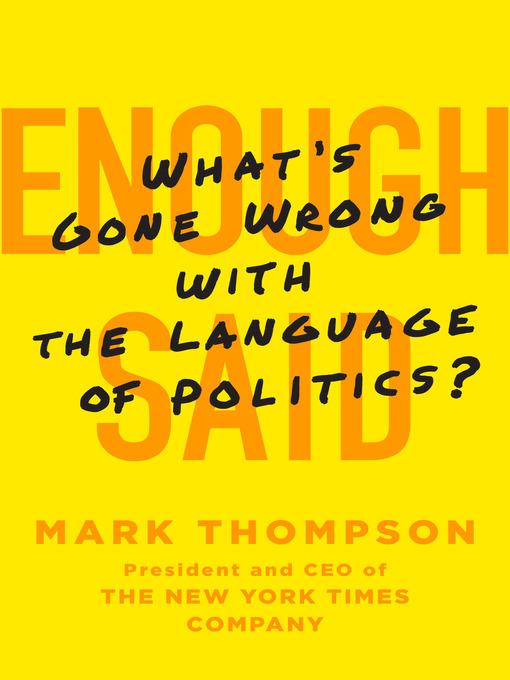
Enough Said
What's Gone Wrong with the Language of Politics?
کتاب های مرتبط
- اطلاعات
- نقد و بررسی
- دیدگاه کاربران
نقد و بررسی

Starred review from July 18, 2016
Thompson uses his unique vantage point as president and CEO of the New York Times Company and former editor-in-chief of the BBC to assess the deterioration of political language and the current state of the media landscape. Liberals and conservatives agree that the quality of political rhetoric has declined in recent years, and Thompson wants to understand exactly what has gone wrong. He looks back to the era of Thatcher and Reagan to trace how these leaders shaped their public rhetoric differently from each other. Thatcher’s serious-minded discussions of policy represented the “stately old world,” while Reagan showed the way toward a new one with his penchant for witty one-liners. In Thompson’s argument, the downward trend of style over substance eventually led to Sarah Palin’s claim of “death panels” and the vacuous speeches of Donald Trump. Thompson then goes back even further, to Thomas Hobbes and Aristotle, to try to understand how the state and society should deal with the limits of religious tolerance and free speech. His advice for journalists could also serve as a guide for any informed citizen hoping to cut through the spin and counterspin that dominates the news. Thompson’s writing packs a high percentage of insights per page and his book manages to be an exemplary investigation, a history, an autopsy, a practical manual, and a cautionary tale all at once.

July 15, 2016
A veteran British journalist tracks the disintegration of public discourse along the trajectory of his long career covering politics in England and the United States.The proliferation of Donald Trump's crassness of speech, ad hominem attacks, and outright lies is hardly surprising, since they stem from the introduction of the vernacular and the technological into public rhetoric. While there was never any "golden age" of public language, writes longtime journalist, producer, and current New York Times Company president and CEO Thompson, there have been in recent decades "specific accelerants that make our circumstance exceptional. These include the revolution in media and communications that the author witnessed firsthand from his first job as a research assistant trainee at BBC Television just as Margaret Thatcher swept into power as prime minister in 1979. Using classical rhetorical terms as touchstones, Thompson notes that Thatcher's radicalism extended into her language as well; it was "hard-edged, insistent, utterly sure of itself." Eventually, she could not convince the voters of her essential ethos and became the rather unfeeling "thing her enemies said she was." By the time of Ronald Reagan's election, Thompson asserts, the traditional vocabulary of "grandiloquence," used so famously by Franklin Roosevelt and Winston Churchill, had given way to distilled, ideological one-liners that were perfect for TV news but carried little serious policy content. Hiring cutting-edge, cynical marketing teams to spin their messages, these conservative leaders honed "the stylized hyperbole of reality TV, the knowing comic beats of the late-night talk shows." Thompson examines how Tony Blair and his tabloid political editor Alastair Campbell adopted a fierce "combination of professionalism and paranoia" and, along with Silvio Berlusconi and Vladimir Putin, a kind of stringent, populist, adversarial tone the author calls masochistic. The author also thankfully takes on those leaders who promote war and unscience--the outright denial of scientific experts on climate change--as egregious examples of eroding the public trust in language. A pointed, dense expose a la George Orwell.
COPYRIGHT(2016) Kirkus Reviews, ALL RIGHTS RESERVED.

September 15, 2016
Thompson, president and CEO of the New York Times Company and former director-general of the BBC, analyzes communication theory and the ways the media struggles to meet the current dependence on compressed phrasing to fit the 24/7 news cycle and to meet the immediate comprehension demands of consumers. He provides background on communication theory, detailing rhetorical basics such as those laid out by Aristotle, then follows developments though the 20th century focusing on Winston Churchill, Franklin D. Roosevelt, Margaret Thatcher, and Ronald Reagan as consummate users of language that enlightens and persuades. Chapters are devoted to marketing language, unfiltered debate on the Internet, and rationalism vs. authenticism--speech that relies on simple expression to convey honesty, whether truly genuine or not. One fascinating section, "Consign it to the Flames," evaluates and explains how the media meets the challenge to scientific information by such groups as the antivaccine movement and = climate change deniers and looks at the responsibility of the industry to determine when to offer balance to the debate or defer to scientists' conclusions. VERDICT Readers well versed in communication theory and those interested in media studies will find the information here worthwhile and thought provoking.--Jill Ortner, SUNY Buffalo Libs.
Copyright 2016 Library Journal, LLC Used with permission.

























دیدگاه کاربران